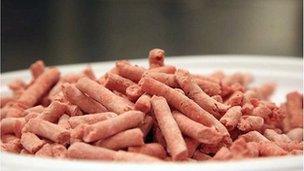'Pink slime' beef off US school menu
- Published
- comments

Some liken the boneless beef to pet food, but others say it is not a nutritional concern
Schools across the US are to be allowed to stop serving so-called "pink slime" beef to their pupils at mealtimes.
In a statement,the US Department of Agriculture said, externalschools buying beef from a central government scheme could now choose from a range of options.
The term has become used to describe a type of beef trimming commonly found in school and restaurant beef in the US.
Reports it was widely used in schools prompted a popular outcry, although the beef is certified as safe to eat.
Social media campaigns and an online petition sprung up to oppose the use of the product. The beef's producerled a campaign, externalto explain it was nutritional and safe.
Last year, British celebrity chef Jamie Oliver publicly criticised the product on his now-defunct US TV show, and McDonald's recently said it would phase out the use of "pink slime" in its burgers.
Centrifugal beef
The US agriculture department said on Thursday it would now offer alternatives to the beef - officially called lean finely textured beef - for schools buying meat through its programmes.
The department (USDA) said the change was "due to customer demand".
"USDA continues to affirm the safety of Lean Finely Textured Beef product for all consumers and urges customers to consult science based information on the safety and quality of this product," it added.
School administrators reacted positively to the change.
"Our district has long advocated for purity and disclosure in food products. And we will definitely be moving to the pure ground beef when that becomes available," John Schuster, spokesman for Florida's Miami-Dade school system, told the Associated Press.
"Pink slime" - a term reportedly coined by a microbiologist working for the US government - is a form of lean beef formed by reclaiming the small parts of meat from leftover cuts with a high fat content.
The beef is spun in a centrifuge to separate the meat from the fat, before the final product is treated with a puff of ammonium hydroxide gas to kill any bacteria.
Produced in bulk by a firm in South Dakota, the pejorative nature of the term "pink slime" has coloured the debate, some experts say.
It is "unappetising", Sarah Klein, of the Center for Science in the Public Interest,told the Los Angeles Times, external, "but perhaps not more so than other things that are routinely part of a hamburger".
"What pink slime reveals to us," she told the newspaper, "is the unsavoury marriage of engineering and food, but it's present in a lot of the products we eat."